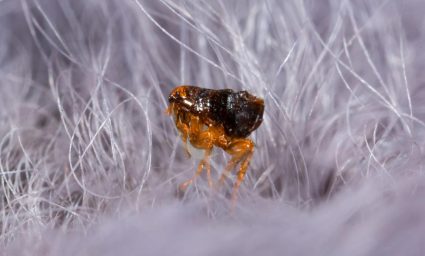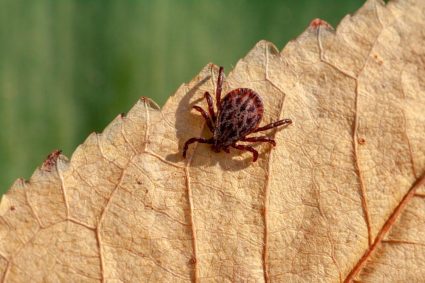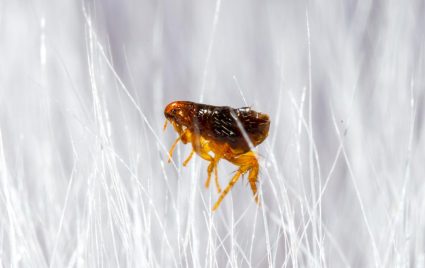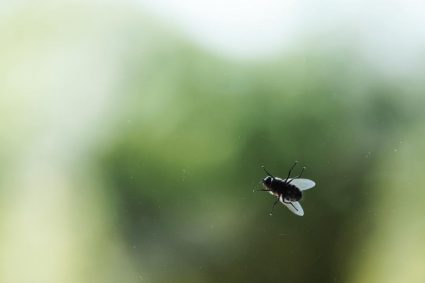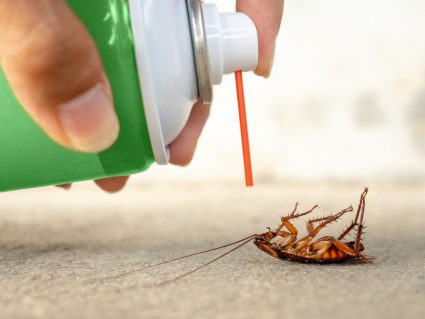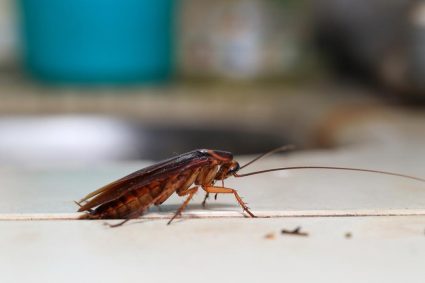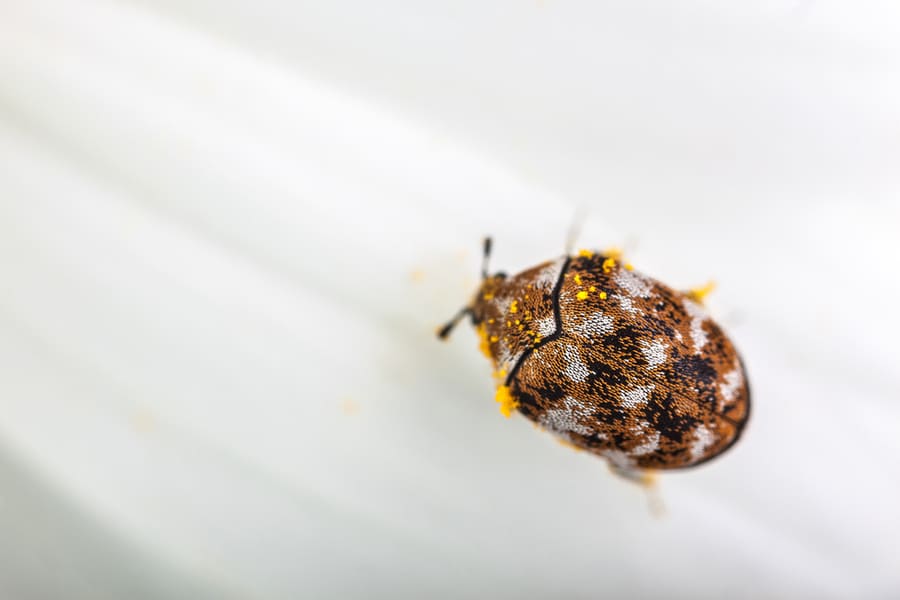
Do you think there are Carpet Beetles in your house? Most likely, your goal is to get rid of them as soon as possible. Right? Fortunately, you can use some scents to permanently deter Carpet Beetles.
Clove, peppermint, cedar, vinegar, neem oil, cinnamon oil, thyme oil, lavender oil, citronella, and eucalyptus oils can all be used to confuse carpet beetles’ sense of smell and drive them away.
The majority of them function both as repellents and insecticides.
Great! So, it is possible to maintain a pest-free house without using hazardous and offensive insecticides to control Carpet Beetles. Read on to discover some naturally effective scents to employ against this well-known insect, the carpet beetle.
10 Scents To Keep Carpet Beetles Away
You should first thoroughly clean your property before figuring out how to repel Carpet Bugs. Additionally, we have listed 10 potent scents that can be used to deter these pests.
1. Cloves

According to a study published in the Journal of Innovations in Pharmaceutical and Biological Sciences, clove oil is the most efficient repellant for carpet beetle larvae. You can buy whole or ground cloves at the grocery store. However, we advise utilizing clove essential oil or whole cloves to keep carpet beetles at bay.
Make full clove satchels using the satchel technique to hang with your favorite wool coat in the closet.
Additionally, you might store them among your wool blankets or put them in a garment bag for sweaters. A clove satchel is useful anywhere else you need to prevent an infestation.
During this repellent time, you must pay attention to how clean your home is! As these carpet beetles will be on the move in search of their next meal, vacuum frequently and make sure to properly clean baseboards, furniture, etc.
2. Peppermint

Peppermint has grown to be a well-liked plant and essential oil for all types of pests. Fortunately, it also deters carpet bugs! Just a reminder, plants will never be as powerful as their concentrated essential oil. Those will always serve as stronger deterrents.
So, to prevent these carpet beetles from entering your home and from landing on the furnishings and textiles in it, think about utilizing Peppermint oil’s natural insect repellent.
Peppermint can be used in various ways around the house to keep carpet beetles from wreaking havoc on your daily life.
- Sow Peppermint! Keep Peppermint near your home’s foundation or entryways (by growing in a container), which are entry points for Carpet Beetles.
- Use Peppermint Oil Spray. Create a spray of Peppermint Oil and vinegar to use as a repellant and spritz on afflicted areas where Carpet Beetles may infiltrate, such as on your carpets and drapes.
- Using cotton balls soaked in Peppermint Oil. Cotton balls with Peppermint Essential oil applied to them should be placed in crevices, woolen shirt pockets, or a tiny, reusable bag.
Note: If you cannot stand the potent scent of peppermint essential oil, do not worry. By adding an equivalent amount of water, the powerful fragrance can be lessened.
However, doing so will reduce its strength, so you’ll need to apply a lot of sprays. Additionally, make sure to give the spray bottle a vigorous shake before using it.
3. Cedar
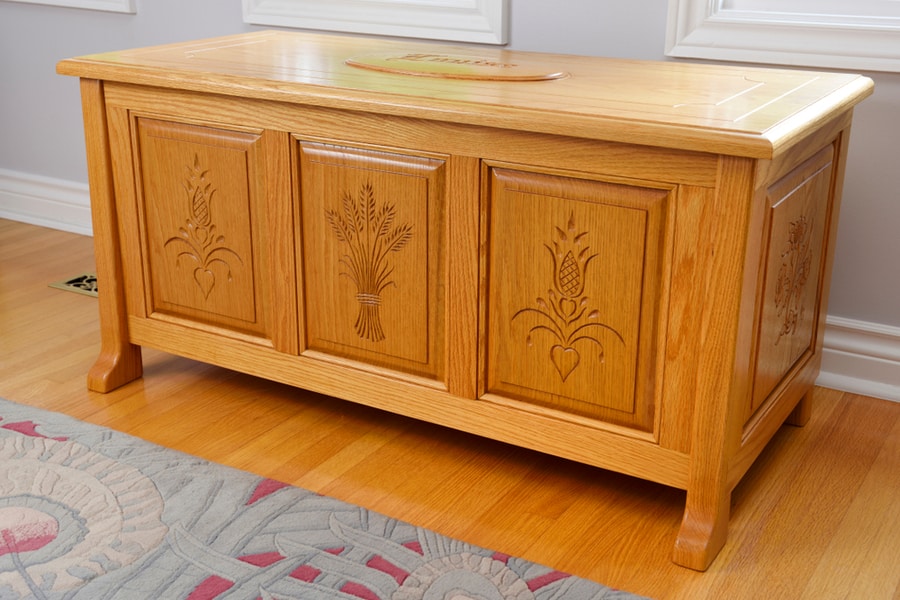
Woolen clothing and blankets have long been kept in cedar chests, and for a good reason: it’s a customary practice among many people. Cedar naturally protects fabrics from pest infestation because of its potent insecticidal capabilities, and it smells far nicer than mothballs.
The issue here is that cedar can eventually lose its potency and efficacy. Nonetheless, there is little danger of an infestation if the chest box is kept completely shut and the clothing within is routinely dry cleaned.
Fresh cedar should be added to the chest’s interior regularly to maintain its effectiveness as one of nature’s best insect repellents.
You may keep the area repellent to unwelcome insects by simply layering some new cedar space cedar blocks into materials. These can be used for many years because you only need to sand the block whenever the aroma dissipates.
Moreover, If you enjoy using essential oils, making a spray with cedarwood essential oil is a wonderful alternative. The advantage of employing a spray is that it can effectively coat entire garments in a particular aroma while also reviving a space.
4. Neem Oil

For hundreds of years, a naturally occurring pesticide called neem oil has been used to eradicate illnesses and pests.
According to the National Pesticide Information Center, the most effective component of neem oil used to ward off and occasionally kill pests is azadirachtin. It affects an insect’s hormonal system. Neem oil also contains other ingredients that prevent insects from feeding.
There are several forms in which neem is available, most of which will smell bad. More so than inside the house, neem is a very popular natural pesticide used outside in gardens to protect plants.
5. Cinnamon Essential Oil

Cinnamon works as an insect repellant and pesticide. To get rid of carpet beetle larvae, use cinnamon powder. But it can leave stains on carpets, clothing, upholstery, and more. The essential oil variety of cinnamon is, therefore, the most effective for the task.
Its essential oil is so concentrated that research discovered that it can kill many insects more effectively than DEET (a substance that is frequently present in many of today’s insect repellents)
Cinnamon essential oil and water don’t mix, so diluting it with water is essentially worthless. Many homeowners firmly believe it gains greater effectiveness when combined with a small amount of dish soap after diluting with a carrier oil.
Note: You should avoid getting into contact with cinnamon essential oil because of its potent properties. Otherwise, you risk developing skin burns or even rashes!
6. Thyme Essential Oil

To get rid of carpet beetles in your home naturally, you can rely on thyme essential oil. This oil, which belongs to the mint family, is effective due to a molecule called “thymol” that it contains.
Naturally, thymol has insecticidal characteristics; as soon as it touches insect larvae, including carpet beetle larvae, it will kill them.
Carvacrol, another component of thyme essential oil, is also present. Carvacrol is also plentiful in oregano and works as a natural pesticide, just like thymol.
Note: Use caution when applying it to your skin as an insecticide since it could irritate the skin.
Thyme essential oil should be diluted with distilled water in an identical ratio for your safety. Utilize a spray bottle to apply.
7. White and Apple Cider Vinegar

The vinegar smell repulses carpet beetles. For places where you have discovered carpet beetle larvae, a combination of white vinegar and apple cider vinegar is particularly beneficial.
Since apple cider vinegar occasionally has a sweet smell that may draw other pests and insects in addition to carpet beetles, we would recommend using white distilled vinegar instead.
In addition to repelling carpet beetles, white vinegar’s acidity also works well to destroy any eggs that might still be present in a problem region. This can entail hiding it in a chest or under a mat.
Simply combine vinegar and water in equal amounts, then spray to clean. Verify the product’s specifications for precise information.
8 – 10. Essential Oils of Citronella, Eucalyptus, and Lavander

Other people than just homeowners struggle with the carpet bugs’ voracious appetite. Another party with a stake in keeping its investment safe is the textile sector!
Three essential oils — lavender, eucalyptus, and citronella — were tested on woolen fabric in an experiment reported in the Journal of Textiles. When given a choice between treated and untreated fabric, carpet beetle larvae were most repulsed by citronella and lavender-treated cloth, leaving the eucalyptus-treated fabric the most harmed.
According to this study, citronella essential oil was the most successful at keeping carpet beetle larvae away. Because of its strong aroma and fumigant qualities, carpet beetles stay away from it, protecting the integrity of the materials.
Final Word
While carpet beetles are most active in the spring, if left unchecked, they can cause problems inside your home at any time of the year.
To prevent future pest issues and ward off carpet beetles, we suggest utilizing any of these scents that you choose, along with a good pest management routine around your house and yard all year long.
Frequently Asked Questions
What if Carpet Beetles Are Already in My Home?
Where do you begin when you have found signs of these unwelcome creatures in your house? To help you get started, consider these suggestions:
- Get rid of the source. You might have to throw away seriously infested objects to accomplish this. Cleaning, thorough vacuuming, and treating with the smells suggested in this article.
- Become adept at storage. Clean storage materials should be placed in cedar chests with tight lids and airtight plus bags. Fill in any cracks or holes.
- Defend textiles from more harm. Store them in the freezer, steam clean clothes (if the fabric permits), and wash them in hot water for complete cleaning. This includes clothing, upholstered furniture, rugs, curtains, and other textiles.
- Game trophies should be frozen for 10 to 14 days. Regular cleaning and inspection of these is a good idea, but if there is an infestation, proceed with caution. Every year, give them a good brushing in the sun (We’d suggest doing this in the chilly winter months!) Before putting these goods back in storage, wash and dry clean them as much as possible.
What Has Attracted Carpet Beetles to My Home?
Female carpet beetles prefer to lay eggs where there are plenty of food sources for the larvae they will hatch into, even though adult carpet beetles do choose to stay around outside where their favorite food sources are plentiful.
So, carpet beetles frequently lay their eggs inside of people’s homes because the larvae they produce devour a variety of items, including plant, animal, and fiber-based debris.
Beetles frequently enter homes by flying through unlocked doors and windows. They may linger out on your porches at night since they are drawn to light sources, and they may then fly inside as you enter and exit your home.
That said, female carpet beetles can also lay eggs on clothes while you are outside. If you are not careful, you might unintentionally transport an unhatched brood of carpet beetles into your home.


